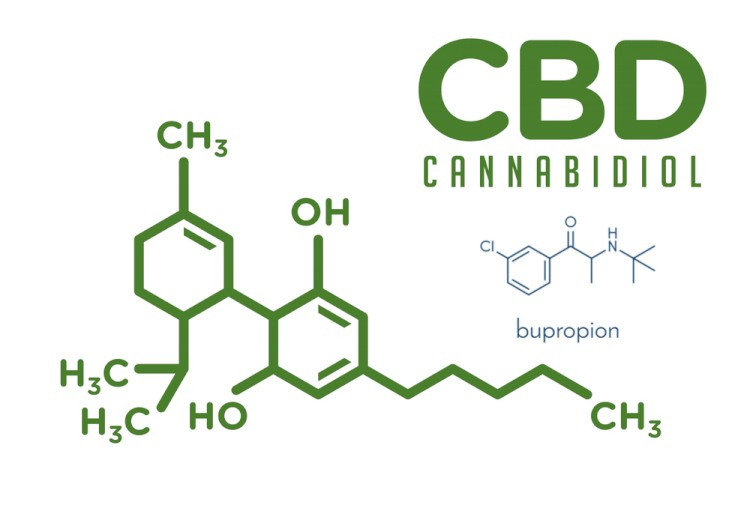Can You Take CBD (Cannabidiol) And Bupropion Together?
There is a potential interaction but the overall effect is complicated and not well understood.

Question
Is it safe to take CBD oil while on bupropion? I currently take bupropion once a day at night. 100 mg. Thanks!

Answered by Dr. Brian Staiger, PharmD
Medical Content Reviewed By HelloPharmacist
Staff
Last updated Jun 19, 2025
Key points
- CBD (cannabidiol) can potentially inhibit or induce (i.e. increase the effects of) the metabolizing enzyme CYP2B6, which is responsible for Wellbutrin (bupropion) metabolism.
- This interaction can have unpredictable effects, either increasing or decreasing the effects of the bupropion.
- If both CBD and bupropion are taken together, you should be appropriately monitored by your doctor.
Answer
There is a potential drug interaction between CBD (cannabidiol) and Wellbutrin (bupropion), although just how severe or concerning it is, isn't well known.
The concern is that taking CBD (cannabidiol) and bupropion together could significantly alter concentrations of bupropion in the body, resulting in either an increased risk of adverse reactions or decreased effectiveness of the drug.
The description of this concern is vague and unfortunately, there haven't been any studies that have specifically evaluated the use of bupropion and CBD together.
The interaction is more theoretical based on what we know about the metabolism and pharmacokinetic profile of each.
Interaction Mechanism
The potential mechanism behind the interaction is as follows:
- Bupropion is a substrate of the enzyme CYP2B6; meaning that the drug is metabolized by it.
- CBD (cannabidiol) may inhibit and/or induce CYP2B6.
- If CBD inhibits CYP2B6, bupropion metabolism will be reduced.
- If CBD induces CYP2B6, bupropion metabolism will be increased.
**Enzyme 'inhibition' refers to a decrease in enzyme effect. 'Induction' refers to an increase in enzyme effect.**
The prescribing information for Wellbutrin, a brand name product containing bupropion, warns about interactions with drugs that affect CYP2B6:
Bupropion is primarily metabolized to hydroxybupropion by CYP2B6. Therefore, the potential exists for drug interactions between WELLBUTRIN and drugs that are inhibitors or inducers of CYP2B6.
Preliminary studies show that CBD (cannabidiol) can both induce and inhibit CYP2B6.
An FDA-Approved CBD Drug Warns Of Bupropion Drug Interactions
Although there aren't many drug interaction studies to draw conclusions from, a prescription CBD product approved in 2018, known as Epidiolex, discusses potential interactions in the prescribing information for the drug and lists bupropion specifically:
In vitro data predict drug-drug interactions with CYP1A2 substrates (e.g., theophylline, caffeine), CYP2B6 substrates (e.g., bupropion, efavirenz), uridine 5' diphospho-glucuronosyltransferase 1A9 (UGT1A9) (e.g., diflunisal, propofol, fenofibrate), and UGT2B7 (e.g., gemfibrozil, lamotrigine, morphine, lorazepam) when coadministered with EPIDIOLEX. ...Because of potential for both induction and inhibition of enzyme activity, consider adjusting dosage of substrates of CYP1A2 and CYP2B6, as clinically appropriate.
Managing The Interaction
As there are very few studies that evaluate the real-world effects of combining CBD and Wellbutrin, if possible, the combination should be avoided.
Nevertheless, if CBD represents a good and potential treatment option for you, be sure to only use CBD and Wellbutrin together under the supervision of your doctor so you can be appropriately monitored. It's possible your dose of Wellbutrin may need to be adjusted to either improve the clinical effects of the drug or reduce side effects.
Final Words
Thank you so much for reaching out to us!
References
- Epidiolex Prescribing Information, https://www.accessdata.fda.gov/drugsatfda_docs/label/2018/210365lbl.pdf
- A preliminary evaluation of the relationship of cannabinoid blood concentrations with the analgesic response to vaporized cannabis, PubMed
- Differential inhibition of human cytochrome P450 2A6 and 2B6 by major phytocannabinoids, Springer
-
 Dr. Brian Staiger, PharmD
Dr. Brian Staiger, PharmD
- 13321 views


